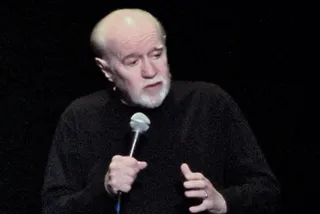
A Comedian's Guide to Public Speaking
To most people there is nothing funny about public speaking. In fact, the fear of speaking in public ranks higher than the fear of death, disease, and being buried alive. People often overlook the world of stand-up comedy when seeking public speaking advice but comedians are experienced professional orators and can offer invaluable tips for anyone preparing a speech or presentation. Here are a few things you can learn from comedians when approaching the daunting challenge of public speaking.
Know your audience.
Successful comedians tailor their material to the audience, and actively avoid situations where their material is likely to be deemed trite, laborious or offensive. Chris Rock is just one example, stating recently that he does not perform on college campuses because students have become easily offended and ‘way too conservative’.
Study Other Speakers
Comedians will tell you they constantly watch performers they admire. They aren’t looking to steal jokes or routines, but they tend to observe things like timing, stage presence, tone and mannerisms and use their findings to enhance their own material. YouTube, Ted Talks, and The Moth are just a few sources that can provide the most valuable lessons and advice. So why not take notes from a few Jerry Seinfeld skits or observe Richard Prior’s comic timing before preparing your next speech or presentation; you might learn a thing or two.
Be Humble
A large number of comedians are self-deprecating. This makes even the most successful comedy superstars come off as just “normal” people. While you don’t have to try to portray yourself as something you are not, try to avoid appearing arrogant. Even if your content is celebrating an impressive achievement or milestone, modesty is usually the best policy.
What You Say is Only Part of the Speech
Comedians excel at non-verbal communication. They use facial expressions, timing, gestures and body language to accentuate stories and routines and have the ability to transform dull and tedious material. If you are addressing a large group, body language and certain gestures can really help you accentuate key points and keep people listening.
Lose the podium
Podiums are a security blanket. They are great for holding your notes, but more often they hinder your delivery. You become rooted to one spot and regardless of what you say, you run the risk of coming off as wooden. You won’t find one successful comedian that does an hour of stand-up behind a podium. When you watch non-comedians speak, you’ll notice that the ones that are the most engaging and compelling vary their movements and speak to the audience from different areas of the stage.
Don’t let mistakes throw you.
Everyone makes mistakes on stage, and your audience will give you some leeway. Learn from your mistakes, so that you don’t repeat them. If you make an error during your speech take a second to recover and gather your thoughts. Short silences are ok and far better than rambling while you try to gather your thoughts.
Brain Storm
You can be assured that the first time a comedian presented their material it was to a small group of friends. Discuss your ideas and presentation with others before you deliver it to the audience. You’ll be surprised how much you can learn from other people’s input; even if it’s negative. George Carlin once said that a lot of the best comedy revolves around making comparisons, so why not compare your ideas with others and see what kind of interesting conclusions you can make about your topic.
Pace your material
Comedians employ a release-recover-release delivery. That means they build up to a laugh, allow for a bit of time to set up the next joke and then deliver the punch line. In your speeches, give your audience a bit of time to absorb each point before building up the next one.
Bring your material full circle
One of the standard comedic techniques is closing the set with a joke that ties-in to the opening joke. In your first few moments you want to supply your thesis; in your conclusion wrap up the points and tie them back to your opening premise.
Make eye contact
Successful comedians constantly make eye contact with various audience members. This creates an immediate and very strong bond between performer (speaker) and audience. Instead of letting your gaze wander over the audiences’ head, sweep the audience at eye level. You will find that you will naturally gravitate to certain individuals due to their facial expressions and interest level. Making eye contact with the various members of the audience not only makes them feel included, but also instils them with a sense of confidence in your presentation.
Picture: The late great George Carlin courtesy of Wikipedia.
Have an enquiry?
Send us a message online and we'll respond within the hour during business hours. Alternatively, please call us our friendly team of experts on +44 (0) 20 7607 7070.
Related speakers
Related from around the site
| Agile Development by Byte9
